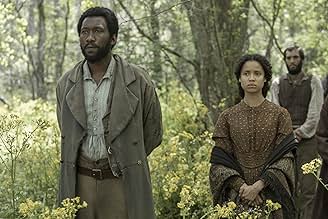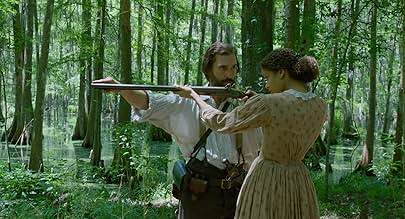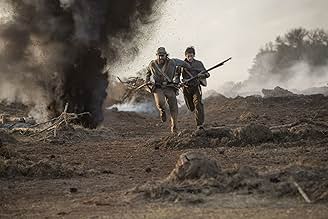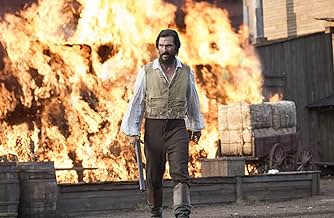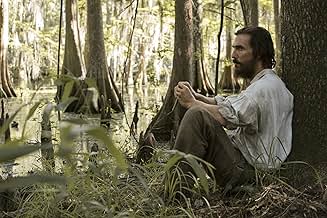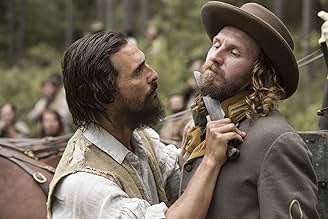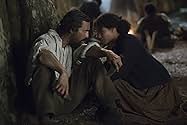Um desertor do exército confederado desiludido retorna ao Mississippi e lidera uma milícia de companheiros desertores e mulheres em um levante contra o governo local da confederação corrupto... Ler tudoUm desertor do exército confederado desiludido retorna ao Mississippi e lidera uma milícia de companheiros desertores e mulheres em um levante contra o governo local da confederação corrupto.Um desertor do exército confederado desiludido retorna ao Mississippi e lidera uma milícia de companheiros desertores e mulheres em um levante contra o governo local da confederação corrupto.
- Direção
- Roteiristas
- Artistas
- Prêmios
- 3 vitórias e 4 indicações no total
- Annie
- (as Jessica Collins)
- Wilson
- (as Donald Watkins)
Avaliações em destaque
My father grew up in Soso, Mississippi. My mother passed away in January of this year. So when the movie came out, and he said he thought he would like to see it, I offered to go with him. He liked that, so today, on my parents 62nd wedding anniversary, which we did not mention, but I am certain was on his mind as much as mine, we went.
The Movies of Lake Worth is in a little strip shopping center out near the Florida Turnpike. It was nice that I could pull up near the curb and let my 84 year old father out with his walker. Nicer still that the walk to the theater where it was showing was the first door inside. The rows were spacious so he could even push the walker in front of him, and we sat.
My father has often talked about the Knight N___gs, of course being an old white man from Mississippi, he uses the word. Funny thing, he doesn't use the "N-word" in conversation, but i guess because the community held the Knights in a "Special" place, this was the title he knows to call them by. He recently told me that his mother, born in 1910 was picking black berries or strawberries and she and her family stopped at the Knight house to get water. That was apparently the only time anyone in his family had anything to do with the Knights.
The movie does a good job of not sugar coating anything, from the battlefield scenes to the trial for interracial marriage (shades of the gay marriage struggle in Mississippi today), to the killings of both white and black folks. The saddest part of the story is how a handful of runaway slaves helped Newton and then many more whites, but in all too common southern white fashion, the white folks, when the war was over and the deserters were safe, they turned on the blacks, even the ones who had saved their lives.
I know the British, the Belgians, the Germans, and 100 other countries, including the US Army has been guilty of equally disappointing human behavior, but this is a story about my people. Some of the people on both sides of the story are probably my ancestors. I know some fought in the Civil War, as confederates. Some probably hid out in the swamp and then betrayed those who helped them when it was time to bring Mississippi out of the dark.
The movie doesn't shy away, it doesn't spare anybody. There are two things I wonder about though.
Knight comes off as being nearly a saint. Maybe he was. Really, with the exception of Rachel and Moses, the Black folks don't have a lot of leadership. Again, maybe because of the times, they didn't, maybe it was understood the being Black and "uppity" was a good way to get killed. I just wonder if it was as much the brave smart white Newt, or if he took a bit of opportunity. Or, more likely, Hollywood has a big bankable white male star and they wanted to give him even more glory than the story had.
I don't know. The whole Free State of Jones is a history so hard to find much truth in. In fact, Mississippi is a place to find much truth in. It is my birth state, but I find more heartache than joy in it. I enjoyed the time with my dad, and it was interesting to see some kind of truth about a bizarre piece of history we have a tangential connection to.
My father's only comment was, "Some people say it was so bad back than, but it was." I think he is right about that.
I was disappointed the theater 100% white people, and with the exception of a 20 something young man and woman who could have been his young mother or older girlfriend, everybody was closer to my dad's age than even my 56 years.
If you are interested in an unvarnished view of parts of American history that you may not know much about, go see the movie. It was well done. It might even be close to the truth.
It's easy to see why the mass audience didn't like this movie. It's too long, it covers too much ground, and while Matthew McConaughey gives the role of ex-Confederate freedom fighter Newton Knight everything he's got, the character just doesn't jump off the screen like Charlton Heston in BEN HUR or Mel Gibson in BRAVEHEART. Newton Knight is just a lovable guy from the word go (we first see him hugging a scared boy on the battlefield, then holding him while he dies) and he has no personal demons (or prejudices) to overcome. He's not driven by personal anger or passion, just by an abstract love of justice.
Related to that problem is the fact that Newton Knight doesn't square off with one single baddie who's tough enough to make it a real fight. Judah Ben Hur goes up against Massala in the chariot race, and they have a whole lot of personal history. William Wallace goes up against Longshanks, Edward I of England, who is so terrifying he almost jumps off the screen. But Newton Knight just fights a bunch of no-name dastardly Confederate officers, most of whom are portrayed as cowardly or incompetent. None of them have any personal grudge against him and no personal magnetism of their own.
So the bottom line is that the general audience was bored to death.
Now with critics I think the story is a lot more sinister. A lot of left wing critics tried to put this movie down as a "white savior" movie in which a perfect white guy has all the answers and saves everyone. The problem with that argument is that it would apply equally well to a movie like GLORY which covers similar events in the exact same time period. But none of the critics ever attacked GLORY or patronized the personal story of Robert Gould Shaw the way they patronized the story of Newton Knight.
And there's a reason why. Robert Gould Shaw, the hero of GLORY, was a real life officer in the Union army. He was a Harvard graduate from a very genteel, distinguished Boston family who volunteered to command black troops and died leading them in a desperate charge against hopeless odds. Nothing wrong with that man's story. But did you notice the words "Harvard" and "Boston" and "distinguished family?" THAT'S the kind of white savior a left-wing film critic can love.
Someone just like them!
The thing about Newton Knight that turned off a lot of big name critics, (like Richard Brody of the New Yorker) is that he's not Robert Gould Shaw. He's not Harvard. He's not Boston. He's not even a West Point man like Grant or Sherman. Newton Knight isn't a white savior, he's poor white trash. Those kind of people are trash -- and they're supposed to ACT like it!
The idea that a poor redneck farmer would make common cause with a bunch of runaway slaves (without government supervision or a liberal college degree) is just as frightening, just as terrifying, to a New York film critic as it would be to a Mississippi planter. Without poor whites to blame for racism, privileged white liberals have no way to justify their privilege. So it's a fundamental article of faith with them that all poor whites are beyond redemption -- a basket of deplorables, as it were.
If you don't believe me, look up a piece Katha Pollitt published in THE NATION in November 2018. It's called "Conservative White Women Won't Change Their Minds," and it's basically a hate-filled rant against all the white women who voted for Trump. But the real point of the article is that changing their minds is a waste of time. Katha Pollitt needs the white trash to stay trash. All her self-esteem depends on the belief that poor whites were and are and will be trash, now and forever.
This movie proves that isn't true -- and that's why leftist critics had to bury it.
In the early Civil War battle scenes, he plays a nurse. Knight is not shown mowing down the enemy with impressive, explosive gunfire. Rather, he is shown risking enemy fire in order to save men's lives, or to retrieve and bury the corpse of a boy shot in battle on his first day. My tears flowed freely during these scenes. Later, Knight himself cries after one of his men is hanged. But Knight gets his revenge, an eye-for-an-eye revenge scene that I won't soon forget.
Newton Knight was a white Mississippi farmer. He was the grandson of a slaveholder, but Knight owned no slaves himself. He served in the Confederate army, but deserted in 1862, after serving for almost a year. He was outraged by the Twenty Negro Law, that allowed families who owned twenty slaves to exempt one family member from service for every twenty slaves they owned.
Knight and other deserters formed The Free State of Jones, declaring their loyalty to the Union, and flying the stars and stripes rather than the stars and bars. After the war, Knight worked for Reconstruction and married Rachel, a freed slave woman. His children also married cross-racially. He died in 1922. As might be expected, he is a controversial figure in Mississippi. Fans of the Confederacy denounce him as a traitor. Others celebrate him as one white Southerner who had a conscience and resisted white supremacy.
Newt Knight was clearly someone with a bucketload of charisma. His power inspired men to fight to the death against their own nation. McConaughey radiates charisma in this role. He is masterful and yet intimate. I'd follow this Newt Knight into battle and feel proud to do so.
"Free State of Jones" is receiving negative reviews. It's easy to see why. There is something in this film to anger multiple grievance mongers.
First, race hustlers will hate this movie. Race hustlers want the official story to be that all whites are supremacists and all blacks are heroic. A film that depicts a white man who worked for black rights is taboo. Race hustlers anathematized "Mississippi Burning" and "The Help" for the same reason. Such a shame that the race hustlers' ideological blindfolds make it impossible for them to appreciate great art.
Liberals might hate this film for a couple of other reasons. I don't know if I've seen a movie where almost every scene hinges on how guns are used. Almost everyone is armed, and uses those weapons to keep breathing and to settle disputes. Even little girls have guns and use them heroically. Second amendment fans may love this film. It depicts what they dream of: oppressed citizenry taking up arms to defeat their own government.
In addition to clinging to their guns, these rebels cling to their God and their Bibles. This is one of the most religious American films I've seen in a while. It's an historical fact that Newt Knight was a devoutly religious Primitive Baptist – he didn't drink, for example. The film drives home Knight's Christianity. He is shown in a long scene using a quill to record a birth in his Bible. In one heartbreaking scene, a slave who has been sexually molested survives psychologically by reciting verses from Genesis. "Free State of Jones" practices a muscular Christianity. One eye-for-an-eye scene takes place in a church.
Republicans will be torn about "Free State of Jones." On the one hand, Knight, like many populist leaders, preaches against economic inequality. "No man should be poor just so that someone else can be rich." I can hear theater seats squeak as Republicans head for the exits. Knight's words, though, reflect the facts. Poor white Southerners were sabotaged by the slave economy and they knew it. That's why they deserted.
But Republicans, if they sit through the entire film, will see how the Republican Party was the favored choice of freed slaves in the post-Civil-War era.
There is a narrative problem in the film. The viewer expects "Free State of Jones" to end after the Civil War. I actually began tying my sneakers, readying to leave the theater. But the film keeps going in what feels like an anti-climax. Gary Ross, the filmmaker, wants to make a point: the Civil War was *not* the happy ending. The KKK rose up, and Jim Crow became entrenched. Black men who tried to exercise their right to vote were lynched. This is an important point, but the film should have been better structured so its narrative flow didn't stop before the film itself did.
"Free State of Jones" was clearly made by sticklers for authenticity. Everyone looks dirty and tired. The clothes look like clothes people wore in the nineteenth century. A confederate officer's uniform looks baggy and tacky, not sparkling and admirable. Scenes are shot in lamplight. I loved this aspect of the film, as will Civil War re-enactors.
It may also be a little too quiet and slow moving for some, but the depth to which the film explores obscure American Civil War facts and events, both during and after, makes one curiouser and curiouser to see where it goes.
This is a rare film that you can watch a trailer of, or not, and not have it ruin the film. In fact, it would be very difficult to anyone to write a spoiler for this. It's also something you want to watch from beginning to end, or at least until the credits shift to white text on black. It may not be the ideal theater film, but it definitely is worthy of a hard copy for your book/DVD shelf.
The movie tells of a counter-rebellion in a Mississippi town during the Civil War, and is based on a true story. The film is done in a style that emulates "Twelve Years A Slave", and as such it deals with topics of slavery and secession in a way that is poignant but also constructive.
In fairness, there are a few things that the film could be rightly critiqued for. The opening scenes of the film are fairly gory and filled with wartime violence, but fortunately that does not dominate the movie. As it progresses, the plot of the film does meander a bit, including a fast forward to a scene from some 85 years after the majority of the film that is interspersed throughout the rest of the movie. That technique felt a bit forced at times, but at the end of the film it made more sense why it had been used.
Additionally, the movie tells its main tale over the course of more than a decade, which makes for a bit of an odd cinematic journey--but, in my view, none of these issues are so problematic that they greatly take away from the movie. Rather, what we have here is a film that was desperately trying to be Oscar worthy, and that perhaps pushes the creative envelope a tad bit too far.
But again, there is more good here than bad. The story that the movie has to tell is both engaging and important--engaging in that it captures your attention and makes you care about the subject matter in a captivating way, and important in that it draws attention to historical facts that you probably were not aware of. I know it certainly highlighted some elements of Reconstruction that were new to me.
Regarding acting, this was perhaps not McConaughey's best role, but it's also not his worst. The supporting cast turns out a strong performance, and all in all the movie is well made.
That said, I'm going with 8/10 stars on this one. It's not the best Civil War flick ever made, and perhaps pales in comparison with other recent historical dramas like "Twelve Years" and "The Revenant", but it's nevertheless a great movie that deserves a "Very Good" score.
Você sabia?
- CuriosidadesIn 2016 a document was discovered in the National Archives which was a request by Newton Knight's company to join the Union Army in 1864. It lends validity to Knight's claims.
- Erros de gravaçãoWhen the plantation owner comes back home after the war and walks through the front door, a thermostat is visible on the wall to his left.
- Citações
Newton Knight: From this day forward we declare the land north of Pascagoula Swamp, south of enterprise and east to the Pearl River to the Alabama border, to be a Free State of Jones. And as such we do hereby proclaim and affirm the following principles. Number one, no man ought to stay poor so another man can get rich. Number two, no man ought to tell another man what you got to live for or what he's got to die for. Number three, what you put in the ground is yours to tend and harvest and there ain't no man ought to be able to take that away from you. Number four, every man is a man. If you walk on two legs, you're a man. It's as simple as that.
- ConexõesFeatured in The History of Jones County (2016)
- Trilhas sonorasBeautiful Dreamer
Written by Stephen Foster
Principais escolhas
- How long is Free State of Jones?Fornecido pela Alexa
Detalhes
- Data de lançamento
- Países de origem
- Centrais de atendimento oficiais
- Idioma
- Também conhecido como
- Lucha por la libertad
- Locações de filme
- Empresas de produção
- Consulte mais créditos da empresa na IMDbPro
Bilheteria
- Orçamento
- US$ 50.000.000 (estimativa)
- Faturamento bruto nos EUA e Canadá
- US$ 20.810.036
- Fim de semana de estreia nos EUA e Canadá
- US$ 7.572.206
- 26 de jun. de 2016
- Faturamento bruto mundial
- US$ 25.035.950
- Tempo de duração
- 2 h 19 min(139 min)
- Cor
- Proporção
- 1.85 : 1







